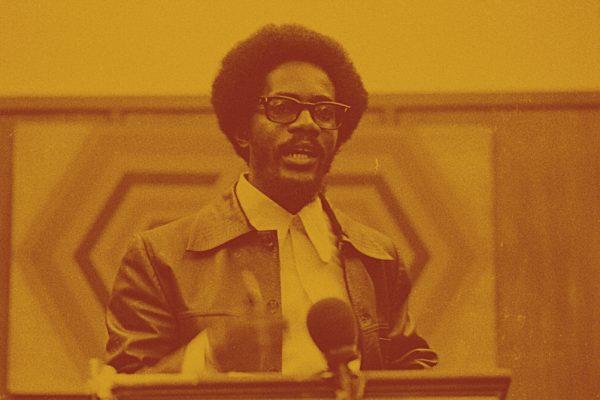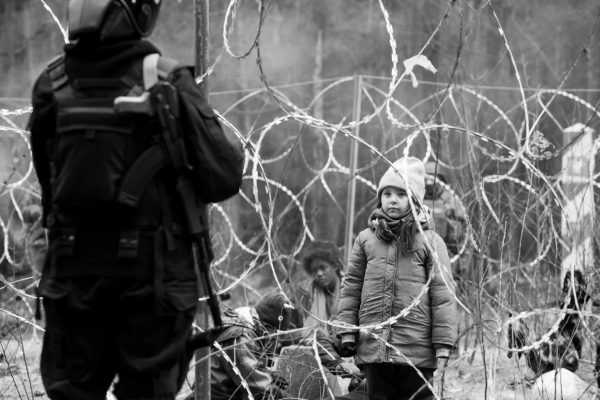Immediately after Grass delivered this speech in Frankfurt in October 1997, Turkish police in Istanbul arrested Esber Yagmurdedereli, a blind civil rights activist and ally of Yaşar Kemal's who had only recently been released after fourteen years of imprisonment. In Turkey, conservative politicians and newspapers lashed out at Kemal, and Grass publicly expressed fears for his safety. Kemal–whose novels, though regrettably little known in the United States, have been translated into thirty languages–had spent time in prison after the military putsch in 1971 and more recently received a suspended sentence partly because of his article in Der Spiegel condemning Turkey's war against its Kurdish minority. In Bonn, too, Grass's comments hit a raw nerve, with the general secretary of the Christian Democrats declaring that Grass had reached "an intellectual low point."
Germany has the dubious distinction of being the only industrialized country whose citizenship laws are based on the lex sanguinis, that is, on ethnic heritage. The junior and more liberal partner in Helmut Kohl's coalition government, the FDP, was in favor of introducing dual citizenship, but progress on the issue was blocked by fierce opposition from elements within the Christian Democrats and their Bavarian sister party. The latter insisted, contrary to all the evidence, that Germany–unlike the US–was not an "immigration country." In October 1997, the German Interior Minister asserted that "there will be no dual nationality in Germany." Whereas newcomers from Eastern Europe who can demonstrate their German ethnicity automatically become citizens, the more than seven million foreigners living in Germany must wait eight years before they are even eligible to apply for citizenship With the recent victory of the Social Democrats, German immigration and citizenship policy seems almost certain to change. Both Chancellor-elect Gerhard Schroeder of the SPD and Joschka Fischer of the Greens have said that they wish to introduce some form of dual citizenship–initially at least for the German-born children of foreigners. Dual nationality is a key issue, particularly for the millions of Turks living in Germany, who for testamentary reasons are reluctant to abandon their Turkish citizenship. Besides, a change in the laws governing citizenship would simply acknowledge a reality immediately apparent to anybody who takes a stroll down certain streets in German cities: whether it wants to be or not, Germany already is a multiethnic society.
-Mark Harman
Dear Yaşar Kemal, you must have had your reasons for proposing me as a speaker for this occasion. I was glad to respond to your wishes and yield to the temptation to glide inland from the Mediterranean, over the flat muddy fields along the coast, then over the lands of Cukorova with its cover of blackberry bushes, wild vines and reeds, then farther inland over the swamps, and then once again over rich farmland, myrrh-fragrant hills, plateaus, including Dikenliduzu with its five villages, where one can already see the snow-covered peaks of the Taurus.
Yaşar Kemal is one of those writers who is content with the patch of earth allotted by birth. As in the case of Faulkner, Akhmatova, or even Joyce, all the events described circle around the site of an early injury. These writers evoke landscapes–they can also be urban landscapes–containing people, who, however lost they may be in their marginal existences, fix their gaze upon the center of the world and take up residence there.
I, too, am well-acquainted with that kind of obsession. That clinging to long lost provinces. For wherever else my sentences may have led, each of them had its roots between the flats of the Vistula and the hills of Kashubia, in the city of Danzig and its suburb Langfuhr, and in the strands along the Baltic Sea. There lie my American southern states, there I lost my Dublin, there extends my Kirghiz Steppe, and there, too, lies my Cukurova.
In this manner, in other words not so much directly as thrice-removed, we, dear Yaşar Kemal, are related. Not only because you as a Kurd belong to Turkey just as I, a Kashubian on my mother’s side, am, despite all the burdensome memories, nonetheless committed to Germany, but surely also because of our tendency to capture our losses in words. This obsession drives us to write against the age and to tell those stories that have not been elevated to the status of affairs of state because they deal with people who never sat on high, who did not dominate but rather were themselves dominated.
Besides, though geographically distant from each other, in certain other respects our countries are quite close, since each is burdened by lasting guilt and since in both societies the majority continues to subject its minorities to callous treatment. When this waning century was still in its infancy, hundreds of thousands of Armenians faced systematic genocide in Turkey; the German crimes, committed innumerable times against Jews and gypsies, can be designated, by way of a warning sign, with a place name: Auschwitz. We were incapable of coming to terms ourselves; our countries launched wars that kept our neighbors in constant dread. We Germans were repeatedly beaten, finally divided, and then for forty years we faced each other, armed, and as if incorrigible; to this day the Kurdish people in Turkey is subject to the state’s arbitrary use of power and military actions, and the victims are mostly women and children. Racial delirium and lack of tolerance, concealed under arrogance, wars, and the consequences of war, mark the history of our countries.
Wasn’t it a high-ranking German politician who not long ago warned of the German people’s becoming "interracialized." And isn’t the latent hatred of foreigners, hedged in by bureaucratese, surfacing in the deportation policies of the current German Interior Minister, whose harshness is echoed by bands of radical right-wing thugs? Over four thousand refugees–from Turkey, Algeria, Nigeria–are locked up in detention centers. In new-fangled German they are known as Schublinge ("shovees"). We are all passive witnesses of a renewed barbarity, which this time around comes equipped with democratic safety clauses.
It is up to us to give thanks to Yaşar Kemal, and one way of doing that is to overcome the coercive policies of exclusion and deportation, to live amongst our Turkish neighbors without whipped-up fears, and what’s more, to demand policies that would finally grant civic rights to the millions of Turks and Kurds in our country.
For decades in Berlin, or more recently in Lubeck, wherever I have lived and written, Turks were part of the street scene. Turkish children were–and are–fellow-students of my children and grandchildren. And I was always certain that these daily encounters with another way of life must be fruitful, for no culture can nourish itself for long off its own resources. When in the seventeenth and eighteenth century large numbers of French refugees–the Hugenots persecuted by the absolutist state who emigrated largely to Brandenburg–arrived in Berlin, these emigrants breathed life into the economy, trade and, not least, German literature; how sketchily the nineteenth century would have come down to us were it not for the novels of Theodor Fontane. Today one can already say the same of the enriching influence of the more than six million foreigners, even though in contrast to the Hugenots, who were granted civic rights in an edict, they are hampered by policies that remain exclusionary and biased against foreigners; it is not simply on walls that one encounters the slogan "Foreigners Out."
Yet the peace prize being awarded today by the German Book Trade Association can perhaps provide a stimulus, no, several stimuli. That would certainly be in the spirit of the prize-winner Yaşar Kemal, whose critique is not directed exclusively at the internal conditions of his country. In an article published only a couple of years ago in Der Spiegel he complained about the persecution of Kurds in his country and at the same time reminded the western democracies of their complicity. He wrote:
On the threshold of the twentieth century one cannot deprive any people, any ethnic group of its human rights. No state has the power to do so. After all, it was the power of the people that chased the Americans out of Vietnam, the Soviets out of Afghanistan, and brought about the miracle of South Africa. The Turkish Republic ought not, through its pursuit of this war, to enter the twenty-first century as a country laden down with curses. The conscience of humanity will help the peoples of Turkey to end this inhuman war. And in particular it is the peoples of the countries that sell weapons to the Turkish state who must help to bring this about.
Ladies and gentlemen, that appeal is also aimed at a German audience. Anybody here at this gathering in the Paulskirche who represents the interests of the Kohl-Kinkel government will know that for years the Federal Republic of Germany has condoned the supply of weapons to the Turkish Republic, which is waging a war of annihilation against its own people. After 1990, when a propitious moment opened up the possibility of German unity, supplies of tanks and armored vehicles were taken from the stockpile of the former People’s Army of the German Democratic Republic and delivered to that war-torn country. We have become and continue to be accomplices. We condoned this quick, dirty business. I am ashamed of my country, which has degenerated into a purely economic entity whose government permits trade that carries death in its wake and, moreover, denies to persecuted Kurds the right of asylum.
A Peace Prize is being awarded. If this distinction honoring a writer of merit truly deserves its name, if the location of this ceremony, the Paulskirche, is to be more than a mere backdrop, if literature, such as the kind I am praising, can still provide an impetus, then I urge and exhort all of the authors, publishers, and booksellers gathered here, everybody who is conscious of his political responsibility, to respond to Yaşar Kemal’s appeal, to take it further and thereby ensure that human rights are respected in his country, so that armed conflict ceases to rage and, even in the most out-of-the-way villages, peace finally reigns.
Translated from the German by Mark Harman







